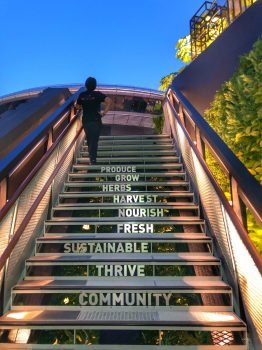Local Futures: Economics of Happiness
Discover > Product Recs > Local Futures: Economics of Happiness
The award-winning film, The Economics of Happiness, spells out the social, spiritual, and ecological costs of today’s global economy while highlighting the multiple benefits of economic localization. Actually, the film is part of a much larger project that aims promote localization and transformation in the food system.
Local Futures:
The All-in-One Solution
It all started in 1978 when Helena Norberg-Hodge and John Page founded ‘The Ladakh Project’ in a remote Himalayan region of India, which was just then being opened to ‘development’. The project provided the Ladakhis with information about the impact of conventional development on other parts of the world, and explored more sustainable patterns of local development based on the use of Ladakhis’ own local knowledge and resources.
Book Review: The Fate of Food - What We'll Eat in a Bigger, Hotter, Smarter World
Explore the future of food in a changing world with our insightful review of "The Fate of Food," offering perspectives on what we'll eat in a bigger, hotter, and smarter world.
Over the years, the scope of Local Futures’ work became increasingly international, and in 1991 we became the International Society for Ecology and Culture (ISEC), now known as Local Futures. The project aims to produce books, films, and other ‘education for action’ tools, and organize activist-oriented conferences and workshops worldwide, including World Localization Day.
Texas Non-Profit Helps the Underprivileged Get a Healthier Diet
Discover how a Texas non-profit is making a difference by helping the underprivileged access a healthier diet, fostering positive changes in community health.
The Economics of Happiness film is absolutely phenomenal, so it has sparked interest and discussion in several international conventions, including the Oxford Real Farming Conference. Local Futures hosts numerous Economics of Happiness conferences around the world, which aim to kick-start broad critical debate about the global corporate economy, while exploring alternatives that benefit society as well as the environment. There is even an DIY Economics of Happiness Toolkit.
Eating Locally and Seasonally in Texas
Embrace a local and seasonal approach to eating in Texas with our guide, celebrating the abundance of flavors and freshness available in your region.
Their events and resources promote a holistic ‘big picture’ view of what it will take to heal the damage caused by the corporate-run economy, and to build structures that foster human and ecological wellbeing.
Programs Helping to Catalyze Systemic Change
The Oxford Real Farming Conference held a discussion was lead by Helena Norberg-Hodge the director of Local Futures & author of the Economics of Happiness. Our food system is central to the most critical issues of our time. Not only is food the one thing that we produce that everyone, everywhere, needs every day, but its production – as well as its consumption – connects us intimately with the natural world. But the globalized food system has separated us from the sources of our food, thereby severing the land-based relationships that informed our species’ entire evolution. This system has become the biggest contributor to climate chaos and ecocide, as well as to the ill-health of humanity.
Transitional Texas Farms Supporting Sustainable Agriculture
Discover Texas farms that are transitioning towards sustainable agriculture, playing a crucial role in supporting practices that benefit both the environment and consumers.
Gain a comprehensive understanding of the food system with our guide, exploring the interconnected processes that bring food from production to consumption.
Transforming our Food Systems
We need to start transitioning away from large-scale, industrial mono-culture farming for centralized markets. And move towards diversified, smaller-scale place-based food production. We really can maximize productivity and feed the world, while simultaneously minimizing resource use, healing ecosystems, and increasing the number of livelihoods. Recognizing this truth is the doorway into a new paradigm, one that empowers us to support human flourishing even as we begin to solve our ecological crises at their systemic root cause.
The Food Tank Blog: Forward-Thinking for Food and the Future
Stay informed and forward-thinking with insights from The Food Tank Blog, addressing key issues and innovations shaping the future of food and agriculture.
Helena explains that the truth is... small-scale diversified farms can do so much more than the dominant system in place. We can diversify our land by incorporating medicinal plants, woodlands, pasture for animals, seasonal fruits and vegetables; and feed our people on a local scale. How can it be - that governments are continuing to support the movement of large grocery chains and industrial agriculture? Helena explains that this is due to referencing an outdated model of growth. A model based on continuously supporting global finance and trade - at the expense of local economies. The Economics of Happiness is FREE on Vimeo and YouTube. Local Futures continues their meaningful work through the donations of supporters. You can watch the 3-minute trailer on YouTube.
Is Alternative Living and Circular Thinking the Solution
Contemplate alternative living and circular thinking as potential solutions for a sustainable future with our exploration of these innovative concepts in the context of food and agriculture.
And be sure to check out more of our TexasRealFood resources such as The Future of Food, Food Tank and Modern Farmer blogs. As well as our online directory for Texan food choices and tips on how to shop local.
Connect with the source of your food by exploring our guide on how to get in touch with your food, promoting a deeper understanding and appreciation for the food you consume.




